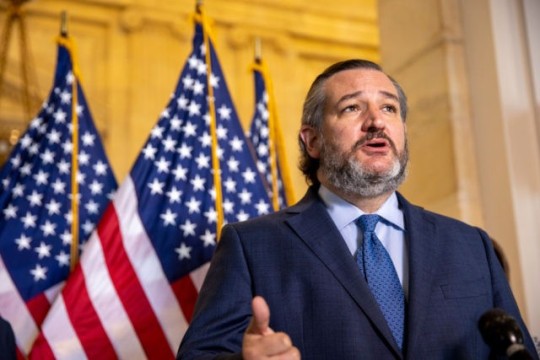#Kelly Shackelford
Explore tagged Tumblr posts
Text
32 notes
·
View notes
Text
Commission members and advisers have pushed Christian nationalist, anti-Muslim, and anti-LGBTQ rhetoric in right-wing media
Written by Payton Armstrong
Published 06/12/25 9:26 AM EDT
President Donald Trump’s newly created Religious Liberty Commission and the three advisory boards designed to support it include multiple right-wing Christian media figures with histories of extremist rhetoric and advocacy.
Trump has officially tasked the commission with producing a “comprehensive report” with “strategies to preserve and enhance religious liberty protections for future generations.” Advocates for the separation of church and state, however, argue that the commission is a “theocratic power grab masquerading as liberty and freedom,” and it “is not about religious liberty, but about advancing Christian nationalism.”
Many of the commission and advisory board members have histories of pushing Christian nationalist, anti-Muslim, anti-LGBTQ, and anti-abortion rhetoric in right-wing media, both as guests and hosts. They include televangelist and current White House Faith Office adviser Paula White-Cain, who has advocated for right-wing Christians to impose fundamentalist values in government; radio host Eric Metaxas, who has labeled Islam a “death cult” and called for an “infiltration” of conservative Christians into government; FlashPoint host Gene Bailey, who has labeled himself a “Christo-fascist, Christian nationalist”; and attorney Kelly Shackelford, who has argued for right-wing Christians to “occupy” public life in the U.S.
85 notes
·
View notes
Photo

(via Ginni Thomas Privately Praised Group Working Against Supreme Court Reform: “Thank You So, So, So Much”— ProPublica)
In a call with donors, First Liberty Institute’s Kelly Shackelford read the supportive email he said came from Thomas. The leader of the religious-rights group also labeled Justice Elena Kagan “treasonous” for backing a stronger ethics code.
2 notes
·
View notes
Text
1 note
·
View note
Text
Ginni Thomas Email Praised Group Opposing SCOTUS Reform — ProPublica
STOP NAZI VANILLA ISIS
0 notes
Text
Ginni Thomas Email Praised Group Opposing SCOTUS Reform — ProPublica
0 notes
Text
Undeniable: The Survey of Hostility to Religion in America - 2016 edition by Kelly Schackelford
The Survey of Hostility to Religion in America by Kelly Shackelford. ****** This was a long and boring book to read, however, each and every case within it concerns every aspect of the hostilities toward our religious liberties and rights. Each and every case is highlighted with a blurb of what the case concerned and whether or not the case was ongoing or was resolved (good or bad.) It is…

View On WordPress
0 notes
Text
Nikki McCann Ramírez at Rolling Stone:
After a summer of scrutiny of the ethical practices of Supreme Court justices and their spouses, Ginni Thomas is once again proving the need for reform within the court. Thomas — the wife of Justice Clarence Thomas — has lavished praise on a legal group opposing the Biden administration’s efforts to introduce a binding code of ethics to the Supreme Court. ProPublica reported on Wednesday that Kelly Shackelford, president and CEO of First Liberty Institute, read an email from Thomas during a July 31 phone call with major donors to the conservative political group. “YOU GUYS HAVE FILLED THE SAILS OF MANY JUDGES. CAN I JUST TELL YOU, THANK YOU SO, SO, SO MUCH,” Thomas wrote in the email, in praise of First Liberty’s work opposing efforts to strengthen justices ethical obligations to the public. Shackelford told donors that the email was an affirmation of the work they were doing on behalf of judges who “can’t go out into the political sphere and fight.”
“It’s neat that, you know, those of you on the call are a part of protecting the future of our court, and they really appreciate it,” he added.
If Shackelford’s views weren’t explicit enough, he went on to attack Justice Elena Kagan as “treasonous” and “disloyal” for advocating for an external mechanism of enforcement of the Supreme Court’s ethics guidelines. The battle over Supreme Court ethics reform intensified in May after Justice Samuel Alito refused to recuse himself from cases related to Jan. 6 despite reports that the justice had flown flags associated with the movement to overturn the 2020 election results outside of his residences. Alito blamed his wife, Martha-Ann Alito, for flying one of the flag’s outside of the couple’s home. Mrs. Alito is by no means the first Supreme Court spouse to invite controversy into the court. Ginni Thomas has plenty of her own links to the 2020 “Stop the Steal” movement, and has been a party in the scandal surrounding her husband’s relationship with influential conservative billionaires.
Ginni Thomas, the wife of SCOTUS Justice Clarence Thomas, gave praise to right-wing legal group First Liberty Institute for opposing SCOTUS Ethics reforms such as the proposal for a binding ethics code.
#Ginni Thomas#First Liberty Institute#SCOTUS#SCOTUS Ethics Crisis#Kelly Shackelford#Samuel Alito#Martha Ann Alito#Clarence Thomas#SCOTUS Ethics Code
12 notes
·
View notes
Text
Freedom from / of
“There’s no freedom from religion if there’s freedom of religion. There’s no freedom from speech if there’s freedom of speech.” —Kelly Shackelford
13 notes
·
View notes
Link
0 notes
Photo








The Love Boat: A Valentine Voyage - CBS - February 12, 1990
Comedy / Drama
Running Time: 120 minutes
Stars:
Gavin MacLeod as Captain Merrilk Stubing
Jill Whelan as Vicki Stubing
Bernie Kopell as Doctor Adam Bricker
Ted Lange as Isaac Washington
Steve Bond as Kirk
Tom Bosley as Lt. Robert Logan
Julia Duffy as Myrna Foley
“Rowdy” Roddy Piper as Maurice Steiger
Shanna Reed as Nina Morgan
Joe Regalbuto as Tony Blanchard
Ted Shackelford as Paul Royce
John Terlesky as Chris
Kim Johnston Ulrich as Kelly
Jerry Lacy as Arnold Foley
#The Love Boat: A Valentine Voyage#TV#CBS#1990#Comedy#Drama#Gavin MacLeod#Jill Whelan#Bernie Koppell#Ted Lange
61 notes
·
View notes
Photo

Ted Cruz, Conservatives to Hold West Virginia Rally Against H.R. 1, the ‘Corrupt Politicians Act’
Sen. Ted Cruz (R-TX) and conservative activists will hold a rally at the West Virginia state capitol Saturday against the “Corrupt Politicians Act.”
The Council for National Policy Act will host a rally at the Charleston, West Virginia state capitol at 1:00 P.M. Eastern.
The rally will feature conservative leaders to rally against H.R. 1/S.1, the For the People Act, which the leaders refer to as the “Corrupt Politicians Act.” The legislation already passed the House. The rally will feature:
Sen. Ted Cruz;
Eric Berger, co-founder of FreeRoots;
Jake Hoffman, president and CEO of Rally Forge;
Ken Blackwell, board member of CNP Action and former Ohio secretary of state;
Kelly Shackelford, chairman of CNP Action, and president and CEO of First Liberty Institute;
Mike Thompson, senior vice president of CRC Advisors.
The rally precedes a hearing on the bill held by the Senate Rules Committee on March 24.
The rally would presumably work to lobby Sen. Joe Manchin (D-WV), a moderate Democrat and swing vote in the 50-50 split Senate.
Manchin’s support or opposition to the Corrupt Politicians Act could help pass or tank the legislation as it works its way through the Senate.
The Corrupt Politicians Act is 791-pages long and would enact a massive transformation of America’s electoral system.
The legislation would:
Federalize control over congressional elections;
Declare that standard state and local maintenance of elections systems, such as purging ineligible voters from voter rolls, limiting vote-by-mail, requiring voter ID, and establishing rules against felons voting, would erode the right to vote;
Restrict lawsuits against the rules in H.R. 1 to the federal court system, which is, coincidentally, favorable to Democrats;
Establish online and automatic voter registration;
Protect illegal immigrants from prosecution if they vote;
Establish same-day voter registration;
Register minors to vote;
Mandate early voting;
Establish nationwide vote-by-mail without a voter ID; and
Allow ballots to be counted ten days after Election Day.
Sen. Cruz said this week the Corrupt Politicians Act is the most “dangerous piece of legislation before Congress.” He explained:
It is the single most dangerous piece of legislation before Congress. What I call H.R.1 is the ‘Corrupt Politicians Act.’ […] It’s the number one bill. It’s not about COVID; it’s not about vaccinations; it’s not about getting people back to work; it’s not about getting kids back to school.
It is about ensuring that Democrats remain in power and control for the next 100 years. It is a radical bill. What does it do? It federalizes all elections. It strikes down every election reform protection at the state level.
So photo ID laws — right now in a lot of states you’ve got to use photo ID to vote — ‘The Corrupt Politician Act’ strikes that down. It sets up automatic voter registration, which would result in millions of illegal immigrants, and criminals, and felons being able to vote.
The Democrats believe if illegal immigrants and felons are voting, that benefits the Democrats and keeps them in power. Not only that, it mandates universal mail-in balloting, it mandates ballot harvesting. This is all designed to facilitate fraud.
READ MORE ABOUT
Politics election integrity For the People Act Joe Manchin Kyrsten Sinema Ted Cruz
1 note
·
View note
Text
SCOTUS’ MOST Important Decision for Religious Freedom | Joe Kennedy & Kelly Shackelford | Huckabee
SCOTUS’ MOST Important Decision for Religious Freedom | Joe Kennedy & Kelly Shackelford | Huckabee
https://rumble.com/embed/v11wrik/?pub=cwkzv
View On WordPress
0 notes
Link
Conservatives with high expectations anxious for Justice Amy Coney Barrett to show her hand Barrett has only been on the bench since late October, providing an exceedingly small sample size, but her votes not backing President Donald Trump in attempting to overturn the 2020 election as well as a mixed ruling in a clash between houses of worship and California have brought concern to some who heralded her nomination. The nervousness so early in her tenure reveals more about the high hopes of the conservative movement that has finally obtained a 6-3 majority than it does about Barrett’s own jurisprudence. “You have a lot of people in the conservative movement who are so far disappointed and a little despondent about those votes,” said Kelly Shackelford, president of the First Liberty Institute — a group dedicated to defending religious liberty. “But I think they are reading way too much into what evidence we have so far,” he said, noting that the votes came in emergency applications and cert petitions, and not in published opinions. “Instead, we have to wait on significant opinions before we can tell where she is.” A separate source with close ties to religious liberty groups said that he had had a similar conversation with “more than a handful of people.” “There is concern and worry,” the source said, going as far as to call Barrett “timid,” but acknowledging a “‘wait and see’ component.” The source expressed concern that the court would end up in a 3-3-3 lineup in some cases with the liberals on one side, and Chief Justice John Roberts, Justice Brett Kavanaugh and Barrett in the middle and Justices Samuel Alito, Neil Gorsuch and Clarence Thomas on the far right. Trump’s most lasting legacy will be his judicial nominations, and conservatives are impatient to see how the more than 200 judges — including three justices — he nominated to the federal bench will reshape the country. Worries among supporters for judicial nominees or disdain for rulings that overshadow their overall record is nothing new for advocates. Roberts, for instance, has expanded 2nd Amendment rights, gutted the Voting Rights Act and has voted against same-sex marriage, but also saved Obamacare. Last term, many conservative allies were stunned by an opinion penned by Trump nominee Gorsuch that went in favor of LGBTQ workers, although Gorsuch has cast other votes in their favor, particularly on the issue of religious freedom. They are hoping that Barrett will not surprise them in the big cases, and instead, solidify the court’s rightward tilt, fulfilling Trump’s promise to change the direction of the court. The worst-case scenario for conservatives, of course, is that she would eventually be like Justice David Souter, the George H.W. Bush nominee who eventually joined the liberal wing. But there is nothing in Barrett’s record to indicate that would happen. The perception of Barrett could change instantly however with a couple of key cases. The justices have heard oral arguments in a case that could determine the future of Obamacare, as well as a significant religious liberty dispute out of Philadelphia. Also pending is a petition concerning a Mississippi 15-week abortion ban that would be a direct challenge to Roe v. Wade. It takes four justices to agree to hear a case, and it would be a major signal of Barrett’s intentions if she indicates publicly her stance. In addition, on Friday the court is considering whether to take up a case next term concerning the scope of the Second Amendment — an issue the justices have so far declined to revisit over the past decade. Next term could also bring cases on affirmative action and voting rights. A Republican who worked on Barrett’s nomination on the Hill said he hasn’t heard of similar concerns among the GOP senators who were deeply satisfied with her performance during her confirmation hearings and believed by the end of the term, Barrett would vote solidly for the right side of the bench. Despite any hand-wringing or nervousness, Barrett’s impact has already been felt on the court’s strong 6-3 conservative majority. On the bench, Barrett voted in her first abortion-related case granting the Trump administration’s request to reinstate long-standing restrictions for patients seeking to obtain a drug used for abortions early in pregnancy, over the dissent of the three liberals. It was Barrett who cast a key vote in a November case challenging Covid restrictions put in place by New York Gov. Andrew Cuomo, a Democrat, limiting the number of people attending religious services. Barrett sided with the conservatives in favor of the houses of worship, while Chief Justice John Roberts joined the liberals in dissent. The vote was notable because before the death of Ginsburg, the court split 5-4 on similar cases out California and Nevada ruling in favor of the states. The majority flipped with the addition of Barrett. The 2020 election Those who wanted the court to weigh in on the 2020 election, however, were disappointed as the court sent a strong signal it had no interest getting involved with election results, despite an enormous amount of pressure from Trump. The former President has many times expressed bitter disappointment with the court for failing to rule in his favor to overturn election results, most recently in a Fox News interview last week. Barrett did not take part in an order on October 28 — two days after her confirmation — when the Supreme Court denied a request from Pennsylvania Republicans to accelerate review of a lower court decision that allowed ballots to be counted up to three days after Election Day. The court’s public information officer said at the time that Barrett did not participate because of the need for a “prompt resolution” and because she had not had time to fully review the filings. The move was not out of the ordinary for a new justice. But still, it came as Alito, joined by Gorsuch and Thomas, wrote a fiery statement saying that while they “reluctantly concluded” there was not enough time at this “late date” to decide the case before the election, they were troubled. “There is a strong likelihood that the State Supreme Court decision violates the Federal Constitution,” Alito wrote. When the case came up again on February 22 the court denied an appeal from Republicans to take up the case. Alito, Gorsuch and Thomas again dissented. “Now, the election is over, and there is no reason for refusing to decide the important question that these cases pose,” Alito said. It would have taken four justices to take up the case, and there were only three. Barrett, among others, did not raise her hand. In December, the court also rejected a bid by Texas to overturn the election results in battleground states. In a brief order the court said that Texas did not have the legal right — known as “standing” — to bring the challenge. No full dissents were noted although Alito and Thomas disagreed on a procedural point in a statement. The election-related votes were in contrast to comments Trump made before the election in which he suggested the justices might end up deciding it. Back then Trump said it would be “important to have nine justices.” Religious liberty On another front, eyebrows were raised in early February when a fractured court voted to block California’s Covid-related ban on indoor worship services. Barrett sided with the majority. But she and Kavanuagh did allow other limitations to remain in place. Penning her first concurring opinion, Barrett didn’t go as far as the churches would have liked and voted to allow California’s prohibition on singing and chanting during indoor services to remain. “As the case comes to us,” she wrote, “it remains unclear whether the singing ban applies across the board (and thus constitutes a neutral and generally applicable law) or else favors certain sectors (and thus triggers more searching review).” Barrett did not sign on to a statement from Gorsuch, Thomas and Alito who pointed to some confusion and a record that suggested that the music, film and television studios are permitted to sing indoors. “Even if a full congregation singing hymns is too risky, California does not explain why even a single masked cantor cannot lead worship behind a mask and a plexiglass shield,” Gorsuch said. Five months in, as is the custom, Barrett has only released one majority opinion in a case concerning the Freedom of Information Act. Because she is the junior-most justice, it’s unlikely this term or next that she would be assigned a blockbuster opinion. Source link Orbem News #Amy #Anxious #Barrett #Coney #Conservatives #expectations #Hand #high #Justice #JusticeAmyConeyBarrett:Conservativeswithhighexpectationsareanxious-CNNPolitics #Politics #Show
0 notes

